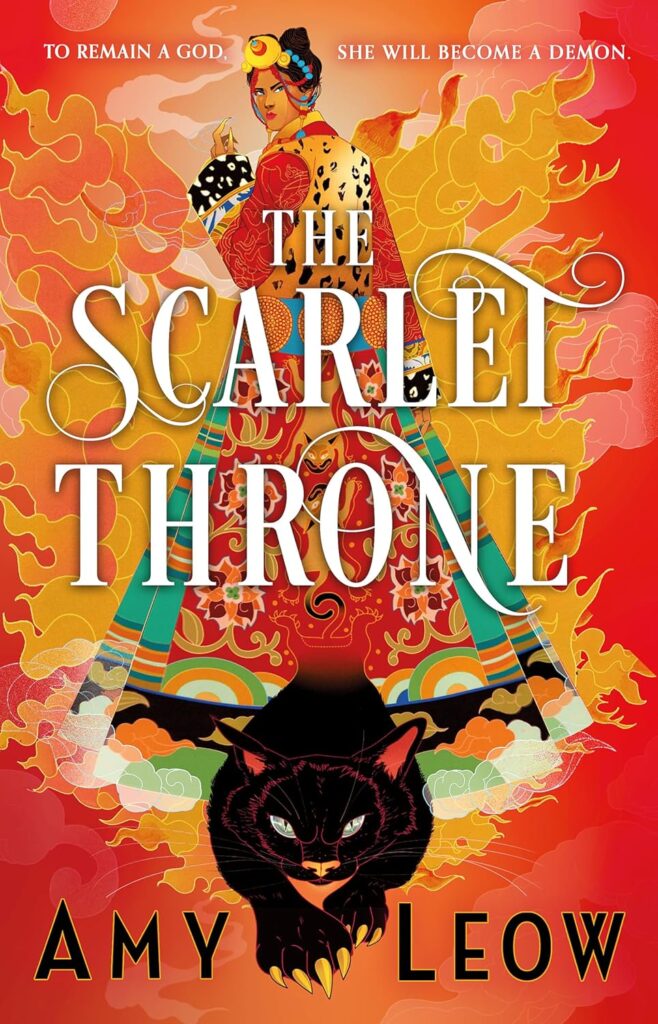
“A woman had been crushed by a goat that fell from the sky.”
Thus begins Malaysian writer Amy Leow’s debut novel, The Scarlet Throne, one of the most assured and deft fantasies to have fallen in my lap in recent times. Deliberating on the case of the crushed woman—on whether her family should be compensated for this dereliction of duty by the gods—is Binsa, the protagonist of the novel.
Let me say from the outset that I thoroughly enjoyed this book and have been pressing our regular customers to get it as soon as it comes out. It’s been a while since I’ve come across a fantasy novel so astutely written and compelling in storytelling. There is a maturity to the world-building which recalls Jemisin’s Broken Earth trilogy, and a deftness in character portraiture, which is particularly tricky in the case of anti-heroes (which Binsa is).
In Leow’s world, the gods directly intervene in all aspects of human activity, from influencing natural phenomena to presiding over the governance of city states—including matters concerning goats. This they do through their Rakthis (or Raktha, the masculine form of the noun)—mortals chosen to be avatars for each respective god to become the central governing figure of these theocratic cities. In Binsa’s case, she is Rakthi for the goddess of wisdom, Rashmatun, and governs Bakhtin, one of 10 city states described in the novel. Leow notes that The Scarlet Throne is inspired by Nepal’s Kumari Devi tradition where young girls are worshipped as divine manifestations, a tradition which is still in practise today.
Binsa, when we meet her, is already dealing with two crucial problems: first, her tenure as a Rakthi is quickly coming to an end. A canny operator, she has been delaying the inevitable by taking drugs and potions to delay the onset of puberty (Rashmatun chooses pre-pubescent girls exclusively to be her vessel during a Trial of Divinity). Even then, the coterie of priests who surround her and who wield the real political power behind the throne are scheming to replace her with a younger, less experienced (read: more compliant) candidate. Having come from poverty and destitution to become Rakthi, Binsa is all too aware of what awaits should she be removed from her position as the goddesses’ vessel, and will do anything to prevent this from happening.

Second, Binsa may not actually be a vessel for a goddess at all. Instead, what she harbours within her is quite the opposite of divine, namely Ilam, a blood demon which takes the form of a giant cat when it manifests itself. Theirs is not a happy relationship but a transactional one insofar as Binsa needs the powers granted by Ilam to perform her duties as a goddess, while Ilam needs Binsa to feed and strengthen him. Ilam is the bequest of her dead mother, a blood shaman, who has taken—and dealt—great pains to elevate Binsa to her current role as Rakthi, including viciously tampering with Binsa’s Trial of Divinity.
Binsa fears and resents Ilam, who is both a threat to her soul and a painful reminder of her abusive mother. Nevertheless, she knows that she needs his power to maintain her position as Rakthi, which means giving in to Ilam’s demands for blood and sacrifice, further setting her down the path of blood shamanism. Moreover, she needs Ilam to get even more powerful as the other Rakthas and Rakthis are conspiring with her priests to depose her. This means more blood, more sacrifice and the further loosening of her already weakening grip on humanity and precious few relationships, particularly a burgeoning maternal/sororal relationship with Medha, her successor.
Leow, in a comment on Goodreads, says that the best way to describe The Scarlet Throne, is “messy”, and she is absolutely bang-on. Messy means complex; messy means layers and texture; messy means moral quandaries. But messy, if done right, also means interesting and satisfying, and Leow does get it right. Her world is rich and finely detailed, but these are judiciously revealed so as to not disrupt the rhythm and flow of the story—a pitfall of many a new fantasy writer. There is, of course, magic and demons and gods, but these aren’t the standout elements of the story. Instead, what takes centre stage in the book is the palace (temple) intrigue, political conspiracy and Binsa’s reluctant transformation into her mother’s heir.
A truly enjoyable book made all the more impressive by the fact that this is Leow’s debut novel.
The Scarlet Throne is available in-store and online. We’re also hosting an event with Amy on 5 Oct. Get tix here.
